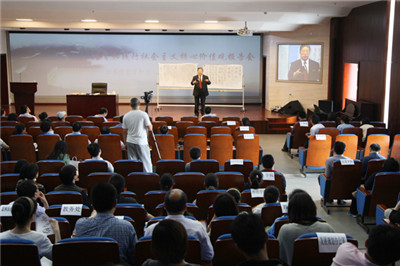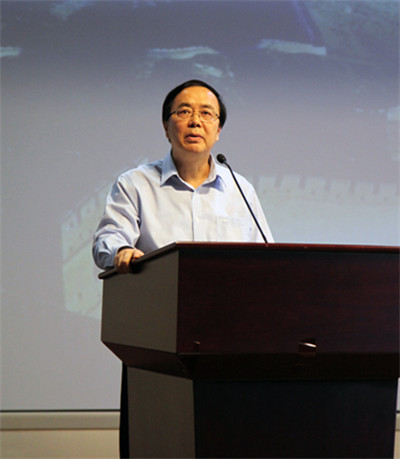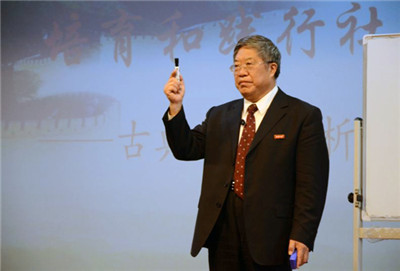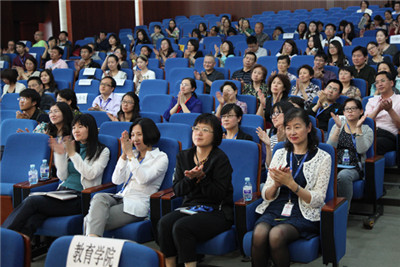 A Traveler’s Song, a renowned poem from the Tang Dynasty, thoroughly stirred the emotions of all in attendance after being interpreted by Professor Cheng Yuzhui of Peking University. This is the actual picture of the meeting place for the “Cultivating and Practicing Socialist Core Values Seminar — Classic Poetry Appreciation and Humanistic Quality Promotion”. The report concluded in warm applause, and Professor Cheng bowed to the audience several times. His solemn and modest attitude won him the respect and appreciation of the whole audience.
A Traveler’s Song, a renowned poem from the Tang Dynasty, thoroughly stirred the emotions of all in attendance after being interpreted by Professor Cheng Yuzhui of Peking University. This is the actual picture of the meeting place for the “Cultivating and Practicing Socialist Core Values Seminar — Classic Poetry Appreciation and Humanistic Quality Promotion”. The report concluded in warm applause, and Professor Cheng bowed to the audience several times. His solemn and modest attitude won him the respect and appreciation of the whole audience.

In order to implement the spirit of the 18th CPC National Congress and the Third Plenary Session of the 18th CPC Central Committee and to fully promote the important role of excellent traditional Chinese culture, which represents a cultivation of good taste and civilized behavior, the Open University of China (OUC) conducted a collective learning activity for its staff. The activity aimed to extract the virtuous spirit of traditional culture and promote the cultivation and practice of core socialist values. Li Ling, Secretary of the Party Committee and the Vice President of the OUC, not only personally invited Professor Cheng to be the keynote speaker, but also lead and supervised the preparation work of this seminar. Li Linshu, Vice President of the OUC, Zhang Shaogang, Deputy Secretary of the OUC Party Committee, Yang Xiaotang, Assistant to the President, and the whole staff listened to the report.

Zhang Shaogang, the host of the seminar, emphasized the four “clear points”, which were suggested by General Secretary Xi Jinping. The four “clear points” should be paid attention to when promoting the excellent traditional Chinese culture. Firstly, it should be clear that every country and nation’s historical tradition, cultural accumulation, and fundamental realities are different, and their different ways of development must have their own characteristics. Secondly, it should be clearly understood that Chinese culture contains the deepest spiritual pursuits of the Chinese nation, and it is essential to China’s survival and development. Thirdly, it should be clear that Chinese excellent traditional culture provides a definite advantage, and is the source of China's cultural soft power. Finally, it should be clear that socialism with Chinese characteristics is rooted in Chinese culture. It not only reflects the will of the Chinese people, but is also in accord with the demands of the development and progress of China and the times. What’s more, it has a deep historical origin and wide basis in reality. Supporting the four “clear points” was the explicit purpose of the OUC Party Committee in conducting this excellent traditional Chinese culture seminar.
Cheng Yuzhui is a Professor and Doctoral Supervisor in the Department of Chinese Language and Literature, Peking University. He is also the Editor-in-Chief of the “Journal of Peking University” (philosophy, social sciences) and an editorial board member of “Sinology Research” of Peking University. He is also the Deputy Director of the Asia-Pacific Research Institute of Peking University, and the Vice-Chairman of the Journal of Arts Society of National Higher Education Institutions. He once gave lectures on poetry appreciation on CCTV’s show “Lecture Room”.


In the seminar, Professor Cheng led the audience in not only learning how to appreciate classic poetry, but also in comprehending the philosophy of life. From the praise of the laborer in “Fa Tan” of Book of Songs, he said that we should respect laborers and migrant workers. From the praise of virtue in “Ju Song” of The Songs of Chu, he concluded that we should seek the truth and improve ourselves. From the sentence “日月之行,若出其中;星汉灿烂,若出其里” (The sun by day, the moon by night /Appear to rise up from the deep. /The Milky Way with stars so bright /Sinks down into the sea in sleep.) in Cao Cao’s The Sea, he concluded that in order to be successful, a person should be broad minded and ambitious. From Tao Yuanming’s “一人入三史”(one man in three historical records), he concluded that people should have a certain amount of self-esteem. People should be confident, but also open to self-examination. From Du Fu’s “安得广厦千万间,大庇天下寒士俱欢颜”(Where can I get a big broad shelter a thousand, ten thousand spans wide, a huge roof that all the world’s poor people can share with smiling faces?), he concluded that kindness is the most basic virtue of people and can make the world better. From the Tang Dynasty poet Meng Jiao’s “慈母手中线,游子身上衣。临行密密缝,意恐迟迟归。谁言寸草心,报得三春晖?”(A thread is in my fond mother's hand moving. /For her son to wear the clothes were leaving./With her whole heart she's sewing and sewing./For fear I'll e'er be roving and roving./Who says the little soul of grass waving./Could for the warmth repay the sun of spring.), he concluded that people should always have gratitude.
The two-and-half-hour speech was filled with humor and wisdom. The value of it lies not only in the spread of the knowledge of classic Chinese poetry, but also, more importantly, in the audiences' deeper pursuit of appreciation for the spiritual heritage passed down through Chinese culture. After the speech, Zhang Shaogang shared his own experience and feelings. He hoped that the staff would remember several words mentioned by Professor Cheng in the speech, such as “broad minded”, “selfless”, “altruistic”, “gratitude”, “happy”, “self-examination”, and so on, and support the building of a successful OUC.

By Zhao Xianghua, the OUC